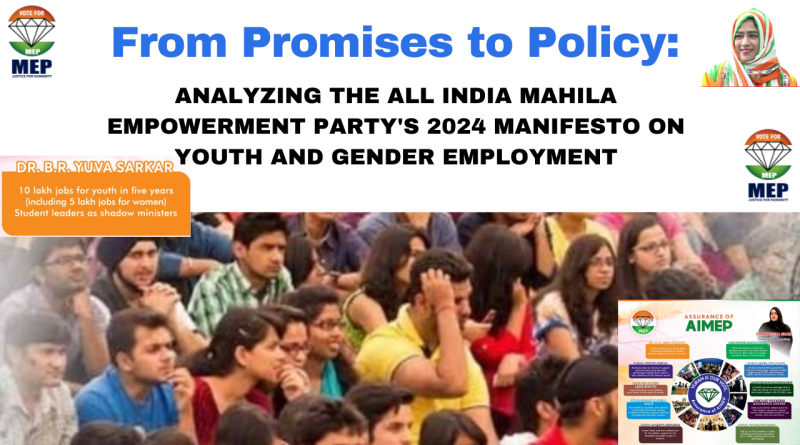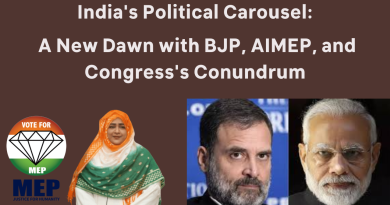From Promises to Policy: Analyzing the All India Mahila Empowerment Party’s 2024 Manifesto on Youth and Gender Employment
Introduction
Welcome to a deep dive into the manifesto of the All India Mahila Empowerment Party (AIMEP) for the upcoming 2024 elections. As we approach this significant political milestone, it’s essential to understand how the AIMEP plans to address some of the pressing issues facing our youth and women through its forward-thinking employment strategies.
Overview of the All India Mahila Empowerment Party (AIMEP)
The AIMEP, a political entity driven by the ideals of gender equality and empowerment, aims to transform these foundational principles into actionable governmental policies. Their focus has been steadfast on creating opportunities and equitable growth for all.
Introduction to Dr. Nowhera Shaikh
Dr. Nowhera Shaikh, the visionary founder of AIMEP, has been a longstanding advocate for women’s rights and economic independence. Her leadership is characterized by a compassionate and pragmatic approach to tackling societal challenges.
Significance of the 2024 elections
The 2024 elections are pivotal for India, especially in terms of socio-economic changes. With an increasing demand for sustainable jobs and an inclusive workforce, the outcomes of this election could set the course for the next generation.
The AIMEP Employment Strategy
Overview of the job creation promise
AIMEP has set an ambitious goal to create 10 lakh new jobs, focusing on sectors that promise substantial growth and sustainability.
Target demographics: youth and women
Specifically targeting the youth and women, the strategy addresses the most affected segments within the job market, aiming to reduce unemployment significantly.
Economic context concerning the need for job creation
In the current economic scenario, where job creation is crucial for economic stability, AIMEP’s focus on empowering these demographics could not be more timely.
Dr. Nowhera Shaikh’s Leadership and Vision
Background of Dr. Nowhera Shaikh
From her grassroots beginnings to becoming a notable leader in business and philanthropy, Dr. Shaikh’s journey is nothing short of inspirational.
Her previous contributions to women’s empowerment
Her initiatives, from educational scholarships to leadership programs for women, have made significant impacts, demonstrating her commitment to empowering women economically and socially.
Expected leadership style in addressing unemployment
Dr. Shaikh’s approach to unemployment is likely holistic, focusing on education, skill development, and sustainable job creation.
Detailed Breakdown of the 10 Lakh Job Plan
Sector-wise distribution of jobs
The jobs are planned across various sectors including technology, healthcare, and renewable energy, which are expected to be the backbone of future economies.
Phased implementation over five years
This tactical approach aims for gradual and sustainable growth, reducing the risks associated with rapid employment inflation.
Integration with existing government employment schemes
By aligning with current policies, AIMEP intends to streamline and maximize job creation efficiency.
Women in the Workforce
Analysis of the promise for 5 lakh jobs for women
Half of the jobs created will be reserved for women, a significant step towards gender parity in the workplace.
Addressing gender disparities in employment
This initiative not only provides jobs but also addresses long-standing barriers such as wage disparity and underrepresentation in leadership roles.
Supporting frameworks and policies for women’s safety and growth at work
In addition to job creation, ensuring a safe and supportive workplace for women is also a priority, underlined in the manifesto.
Innovative Ideas: Student Leaders as Shadow Ministers
Concept and rationale behind involving student leaders
This bold initiative aims to incorporate fresh ideas and perspectives directly from the youth, potentially transforming how government policies are conceived and implemented.
Expected role and impact of student shadow ministers
Student leaders are expected to work alongside actual ministers, providing insights and learning governmental processes, thereby fostering a new generation of informed leaders.
Precedents and comparative analysis from other countries
Internationally, similar programs have proven successful, offering both educational and practical governmental experience to students.
Addressing Challenges and Risks
Possible economic and financial risks
Financing large-scale employment plans will be challenging, necessitating robust fiscal planning and international cooperation.
Socio-political challenges in implementation
Implementing such comprehensive policies will require overcoming bureaucratic inertia and political opposition.
Strategies for overcoming anticipated obstacles
Proactive policy-making, transparent governance, and public-private partnerships will be key to navigating these challenges.
Summary
The AIMEP’s promises for the 2024 elections are not just plans but potential catalysts for significant social and economic transformation, particularly empowering the youth and women. This could well set the standard for future policies across India.



